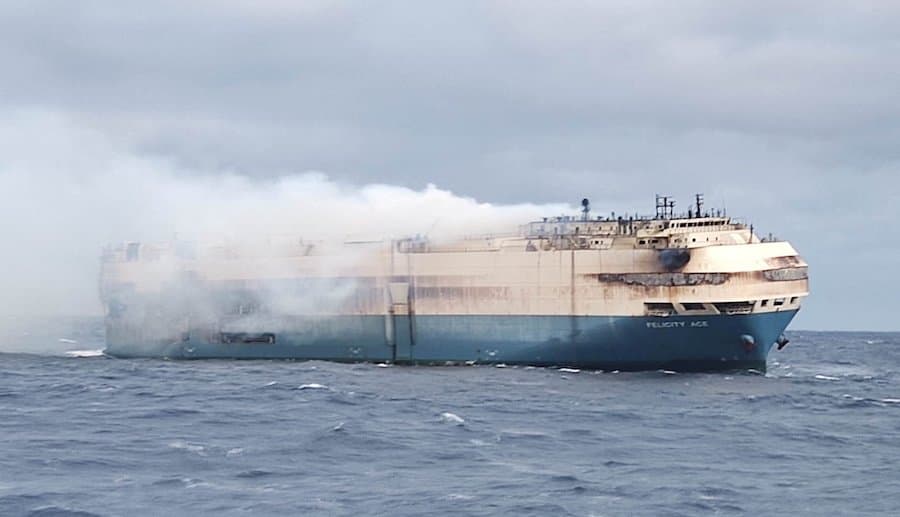There are no comments on this post yet
The Sunken Luxury: The Felicity Ace Disaster 🚢

In February 2022, the Felicity Ace , a Panama-flagged car carrier operated by Japan’s Mitsui O.S.K. Lines, set sail from Emden, Germany, bound for the United States. On board were almost 4,000 brand-new luxury vehicles from the Volkswagen Group, including Porsche, Lamborghini, Audi, Bentley, and Volkswagen models. Together, the cargo was worth around $400 million , making it one of the most valuable loads ever to vanish beneath the waves. 🚗💨
According to manifest data, the cargo included approximately:
🔸 15 Lamborghini Aventadors (final edition)
🔸 20 Lamborghini Huracans
🔸 50 Lamborghini Urus SUVs. About 85 Lamborghinis in total
🔸 846 Audis (including more than 100 e-tron electric vehicles)
🔸 580 Porsches (Cayenne, Macan, Panamera, etc.)
🔸 190 Bentleys
🔸 523 Volkswagens
But halfway across the Atlantic, about 200 nautical miles south of the Azores, disaster struck. A fire broke out in the ship’s cargo decks on 16 February 2022 . The crew of 22 sent a distress call and were safely rescued by the Portuguese Navy, but the blaze continued to rage for days. Despite firefighting attempts and cooling operations, the flames spread uncontrollably through the decks, fueled by tightly packed cars, plastics, and possibly (though never officially confirmed) lithium-ion batteries from electric vehicles onboard. 🔥
For two weeks, the Felicity Ace drifted at sea, shrouded in smoke. Tugboats tried to tow her toward a safe anchorage, but the damage was too severe. On 1 March 2022 , the ship began to list and finally sank into the cold Atlantic, descending nearly 3,000 meters (1.9 miles) to the seabed. The 17-year-old vessel now rests in one of the world’s deepest ship graveyards – an underwater tomb for thousands of luxury cars that never reached their owners.
The cause of the fire remains officially undetermined, yet investigators and maritime experts largely point to battery combustion risks as a potential trigger. Electric-vehicle batteries, when damaged or overheated, can reignite repeatedly even after appearing extinguished – a nightmare scenario on a ship loaded with flammable materials. The Felicity Ace tragedy has since become a textbook case for shipping safety debates, urging operators to revise fire-suppression systems and improve handling protocols for EV cargoes. ⚙️
The economic losses were staggering. The Volkswagen Group faced hundreds of millions in insurance claims, while the shipowner absorbed reputational damage and scrutiny over emergency response procedures. The automotive world mourned the destruction of rare vehicles – including 15 Lamborghini Aventadors , the last of their production line, along with hundreds of Bentleys, Porsches, and Audis. For collectors and enthusiasts, the ship’s sinking felt like the loss of an entire floating showroom of engineering masterpieces. 💔
Environmentalists, meanwhile, warned of ecological danger. The Felicity Ace carried over 2,000 tons of fuel and oil , along with countless batteries and industrial fluids. Though no massive oil slick has been detected since her sinking, the wreck still poses long-term risks – slow leaks of hydrocarbons or toxic metals could harm deep-sea ecosystems for decades. Some scientists note, however, that at 3 km depth, sunlight and oxygen are scarce, which may limit immediate biological impact. Still, the tragedy serves as a reminder that even modern shipping accidents can leave invisible scars on the planet’s oceans. 🌍
And what about divers – can this ship ever become an underwater attraction? Sadly, no. At nearly 3,000 meters below the surface, the wreck is far beyond the reach of recreational or even technical diving. Only robotic submersibles or research vessels could ever visit it. So while it has captured the imagination of maritime enthusiasts worldwide, the Felicity Ace remains a ghost of the deep, a silent symbol of the risks that come with global trade and the unpredictable power of the sea. ⚓
Today, her story stands as a warning and a lesson for all mariners: technology may advance, but the ocean always keeps the final word.
Picture: Portuguese Navy